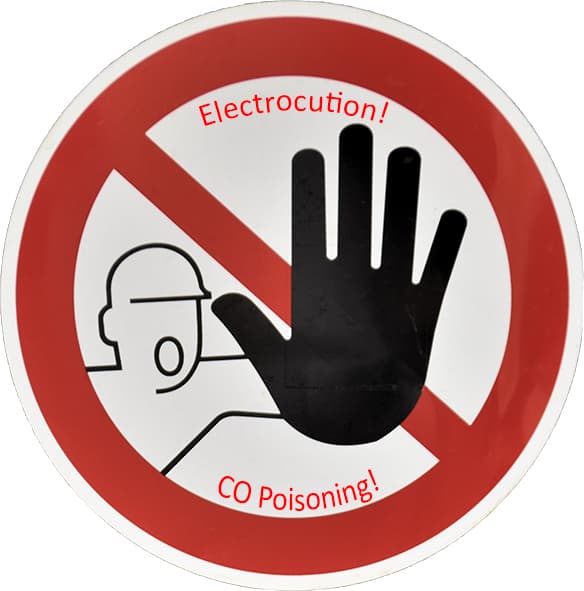
Written by mike on March 22, 2023
Updated on: 19 July 2023
The Dangers of Owning a Portable Generator
Portable Generators can be a Lifesaver but they can also be a Killer
Few would disagree that portable generators are more than just a useful invention. Huge numbers of people have come to depend on them, be it because of severe weather, power outages, or other kinds of emergency. And for some people with medical conditions, having access to a standby supply of electricity can be a matter of life and death.
But it is easy to forget that as well as being a lifesaver, a portable generator can also be a killer, especially when misused.
You may have noticed how much we emphasize in our website how vital it is for you to be constantly aware of the mortal dangers of carbon monoxide poisoning.
This toxic gas, which is produced by portable generators in the combustion process, is the reason why you should never operate a generator in the garage, basement or anywhere else indoors thinking it is safe to do so by leaving the doors or windows open. You might even think that it is safe to start it up out on your porch or outside your back door.
But you would be wrong.
How to Reduce the Risks of Carbon Monoxide Poisoning
The fact is, for safe operation, you must locate the generator at least twenty feet away from your house and at least five feet away from any combustible material such as trees or bushes. You should point the exhaust away from any buildings where people are or might have reason to be. At these minimum distances, changes in wind speed and direction will reduce the dangers of fire and carbon monoxide being blown into the building.
Even so, it is good practice to install carbon monoxide detectors in your property. As you can see from these examples, they are inexpensive and could save your life.
As dangerous as carbon monoxide poisoning is, it is not the only serious risk which you need to always be aware of when operating a portable generator.
Some Other Risks
Electrocution also kills and injures people each year, often as a result of inappropriate use or having ignored manufacturer safety warnings. Be sure to read the manual.
Electrocution
The need for you to keep your generator dry is important. But there will be times when you will have to use it when it is pouring down outside, in which case the dangers of electric shock (injury) and electrocution (death) increase.
Grounding the generator properly is an essential first step in helping prevent the possibility of electrocution. And this is just one of the reasons why it is so important for you to read your model’s manual carefully and, where necessary, ask a professional for clarification when anything is not crystal clear. You should also consult the information on grounding a portable generator provided by Occupational Safety and Health Administration (OHSA).
But you also need to ensure your generator has an appropriate protective cover both for when it is not in use, and to keep out the elements when you have to get it going outside.
You can put the generator on a covered and elevated surface. We show here a variety of covers and sizes that are available for you to buy. Some of these covers are just for storage protection and some are designed so that you can secure them to the ground to prevent rain from getting in. A few others allow you to run the generator while the cover is on.
Some enterprising owners have built their own enclosures, often to also reduce the noise generators make. But these types of enclosure must also be placed a good distance from your house and have plenty of ventilation to avoid the generator from overheating inside and possibly catching fire.
Adapters and Extension Cables
Another danger from electrocution can occur when connecting old or insufficiently rated extension power cords or adapters to and from your generator. The extensions and adapters are important accessories, and you need to have an adequate supply of quality products ready to use if and when necessary.
If in doubt about the kind you will need for connecting your equipment, first check your manual and, if in doubt, always ask a professional. As an indication of the models that are available, we show here a number of alternative Adapters and Extensions that suit different sizes of generator.
Fuel Storage and the Risk of Fire
Occasionally you may get advance warning of potential power outages and other emergencies. In these cases, you will have had enough time to go out and get some fuel to see you through the problem. Other times you may be caught by surprise. It is good to plan ahead and decide how much fuel (both gasoline and propane) to store and where to store it safely because the risk of fire is something you should always have in mind.
Where you live, the Fire Department will more than likely regulate how much fuel you are permitted to store, and how you must store it. For example, some states allow an individual homeowner to store up to 25 gallons of gasoline in a maximum of five-gallon approved containers. You’ll find some excellent examples of fuel Approved Fuel Containers for you to choose here.
Conclusion
Buying and owning a portable generator can be a trouble-free process. Making the right choice at the outset and deciding what else you should get will help to ensure that you are best prepared for any foreseeable eventuality.
